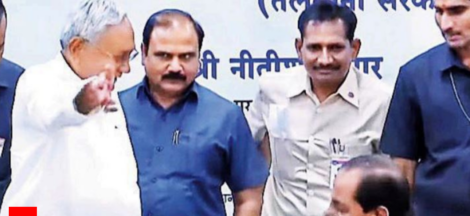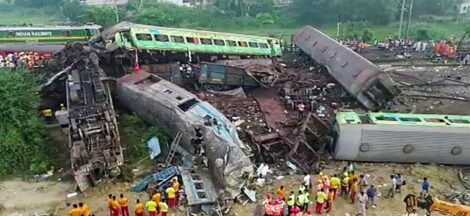By Subrata Majumder
Prime Minister Narendra Modi is not a radical reformer. He is a great administrator and not a reformer as he seems, the Economist said. The report card of his four years governance envisages that he is more laudable in administration and bureaucracy than in economic reforms. Nonetheless, he ushered the country into high growth trajectory and bolstered it into the highest global growth trend, surpassing China.
With absolute majority in Lok Sabha, high hopes loomed large for reform oriented planks, which would make a corruption free society and bring “Achhe Din” in the country. But soon the hopes were belied. The land and labour reforms, which were big ticket reforms mandated, failed to fructify. Endeavour was made to bring the reforms through State legislations. Only a few were successful to attract the investment by these reforms. At World Economic Forum, investors bemoaned the absence of any big ticket reform by7 India government.
Modi has not come with many big ideas of his own. Half of his major reforms were culmination of reforms, whose seeds were sown during the UPA government..Aadhar – the identification of billions’ of Indians – was created in January 2009, under the then Prime Minister Manmohan Singh. GST – the national uniform tax system and the first major taxation reform – was first seeded by Rajiv Gandhi in 1985.
Modi is known as quick fixer to address the chronic problems of administration. He pitched for Minimum Government Maximum Governance. He coaxed the Japanese investors by committing red carpet, instead of red tape. That was the plank of his reforms. He reduced multiple channels for taking decision. He dissolved large number of Cabinet Committees which were overlapping. He reduced Cabinet Committees from 12 in UPA to 6, letting the decision making process faster. Cabinet Committees are the highest body for decision making in the country.
His major attempts for economic reforms can been seen through the lenses of procedural simplifications and faster implementation of the policies. He introduced Jan Dhan Yojona, a scheme to cover a larger part of people in the country. Over 70 percent of the population were brought under banking system, which was hitherto limited to 32 percent in 2013 under UPA. He introduced Indian Banking Code, which will address the bad debts and faster debt recovery, by replacing multiple regulations with single law. He opened up various sensitive sectors expeditiously to allure foreign investors, scrapping the caps for investment. He cleaned off the messy regulations of factory law by scrapping the multiple systems for submitting returns into a single format, with an eye to expedite his Make in India initiative.
In nut shell, his challenges were to seize in hard bargain with bureaucrats to put the reforms on fast tracks. Resultantly, ease of doing business sparked and the business corruption subsided. It helped the nation to leapfrog in high growth trajectory. GDP growth surged from 6.4 percent in 2013 to 7.4 percent in 2016-17. The growth subverted the much hyped paranoia of demonetization and GST, which were the potential salvos of the opposition. The average annual growth rate of GDP during the four years of NDA was 7.3 percent.
Undoubtedly, in the race of reforms, Modi is left much behind Dr. Manmohan Singh. Singh indulged in radical economic reforms, driving the country into a turnaround from a close economy to an open economy. He dismantled the License Raj –the cudgel to desist the private sector to play key role in the economy and empower the public sector. He reworked the industrial and trade policies, abrogating the licensing requirements. He opened up the economy more to the private sectors and foreign enterprises and rejuvenated the Indian stock market.
Dr. Singh enlivened the service sector by ceding several tax concessions. Software companies sprang up, placing the country a pivot for global software exports.
Notwithstanding Modi’s slow pace in economic reforms, India emerged globally a competitive destination for doing business. According to Global Manufacturing Competitiveness Index (GMCI) 2016, by Deloitte survey, India might outbid China in low cost manufacturing competitiveness in the next five years. According to the survey, while China will lose the powerhouse of low cost manufacturing competitiveness, the Mighty Five – the five Asia Pacific nations, Malaysia, India, Thailand, Indonesia and Vietnam – will emerge as the choice for low cost manufacturing in place of China. India will be the frontrunner with four countries chasing behind, the survey said.
India was placed on the rising curve for global ease of doing business. It ranked up from 142 in 2013 in World Bank’ Ease of Doing Business annual survey to 100 in 2017.
FDI surged during Modi regime. It doubled from US $ 22 billion in 2013 to US $ 44 billion in 2017. India had never seen such boom in FDI during Manmohan era, despite he was ascribed as the main architect for economic reforms and opening the door to the foreign investors.
Mr Modi was reckoned a pioneer in reforming subsidy less growth. He dismantled the subsidy base of diesel price mechanism. Diesel oil is an important component for transporting daily essentials, particularly food items, to the market. With the dismantling of diesel oil subsidy, diesel prices increased in proportion to global oil price hike. Food items are generally the triggers for inflation. Despite this, inflation hovered at low ebb.
The chemistry between reforms and growth suggests that reforms do not necessarily lead to growth. Reforms need to be implemented. Surely, Dr Manmohan Singh was the pioneer to open the economy. But, the messy road prevailed for the investors. Modi’s strong challenges to tackle the bureaucrats and implement the reforms, helped the growth. (IPA Service)
.
The post Manmohan Singh Was A Real Reformer With Innovative Policies appeared first on Newspack by India Press Agency.


